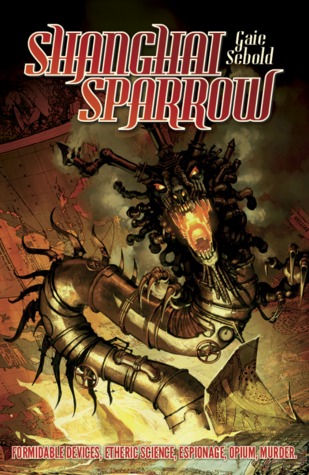When we first meet Eveline “Evvie” Duchen, she is scraping together a living as a pickpocket and con artist on the streets of London. Things used to be very different for her: she lived in the country, in touch with the mysterious Other Folk and fascinated by the Etheric machines her mother built. As Gaie Sebold’s new novel Shanghai Sparrow continues, we slowly find out how exactly Evvie went from her earlier comfortable life to being a street urchin in London.
Then, her life changes again when Holmforth, an ambitious government agent of the British Empire, catches her trying to pull a con and makes her choose: get shipped off to the colonies, or join a secret boarding school for girls who might become useful to the Empire as spies…
Shanghai Sparrow’s setting is interesting: a steampunk version of the British Empire around (I think) the mid-19th century, in conflict with a burgeoning Chinese Empire and with the Other Folk. However, I’d go as far as saying that the publicity copy for this title made it sound much more exciting than it really is: “Shanghai Sparrow is set in an alternative England and China. It contains Formidable Devices, Fay, Etheric Science, Espionage, Opium, Murder and Bartitsu and may not be suitable for those of a delicate disposition.”
Even though Shanghai Sparrow is a good novel and does contain all of those things, I’ll admit that I expected a bit more craziness than it delivered, based on that blurb. It’s actually almost tame compared to what I was expecting. Likewise, calling it “a Far Eastern steampunk tale of espionage, distant empires and thrilling exploits, with a dynamic heroine” is maybe pushing things a bit, given that about 90% of the novel takes place in England and barely contains any Chinese characters.
I’ll agree with the “dynamic heroine” part, though. Evvie is a fascinating, quick-witted main character who has become used to only relying on herself. Placed in numerous difficult situations in the course of her life, she’s always able to fight her way through, even against seemingly impossible odds. She’s refreshingly no-nonsense and matter-of-fact. Yes, she’s almost annoyingly spunky, and it sometimes seems way too easy for her to achieve her goals, but she’s still easy to cheer for and impossible to dislike.
What’s most interesting in this novel is the continued pattern of people trying to control Evvie, and Evvie basically running circles around them. This is most apparent in the case of Holmforth, the government agent who forces Evvie into the boarding school, mainly because he thinks Evvie has inherited some sort of magical ability from her mother, which would allow Evvie to control her mother’s Etheric machines. In reality, Evvie knows (and so does the reader) that this has nothing to do with any sort of inherited ability. She doesn’t even really understand how the machines work. Throughout most of the novel, Holmforth thinks he’s in control, but he really isn’t—and even though Evvie is frequently in a position where she doesn’t have any real power, she always manages to improve her situation.
The novel does have some odd problems. There’s a lengthy section that describes Evvie’s stay at Miss Cairngrim’s school, including descriptions of several teachers and classes that don’t really have any importance to the plot. A few of them do play a small role, but several feel like they could have been cut, or like remnants of an earlier version of the novel where they played a larger part.
A few sections, set in the “crepuscular” fairy realm, feel fairly random until late in the book. That whole aspect of the book is annoyingly vague: you never really get a good idea of what that world or those creatures are like. And Liu, the only (sort of) Asian character in the novel, is both annoyingly mysterious and, worst of all, seemingly able to pop up whenever Evvie’s in a bind to help her out. Combine Liu with Evvie’s already suspicious ability to overcome all sorts of odds, and the narrative loses a lot of tension, because, really, it seems like they can solve anything.
On the plus side again, I like that Shanghai Sparrow doesn’t romanticize the British Empire setting, showing both the hard life of the poor and the excesses of the rich and powerful. Evvie realizes full well that things could get worse—prostitution, transportation to the colonies—and works hard to avoid those fates. The novel also doesn’t get too hung up on its steampunk aspects, focusing on characters and plot instead, and only occasionally taking a brief detour to show travel by airship. And, as advertised, there’s Bartitsu. You can never really have too much Bartitsu, as far as I’m concerned.
Despite some issues, this is a quick and entertaining read. It’s not perfect, but there’s still a lot to like here. If you’re in the mood for steampunk with a spunky young female protagonist, Shanghai Sparrow isn’t a bad choice at all.
Shanghai Sparrow is available now from Solaris.
Stefan Raets reads and reviews science fiction and fantasy whenever he isn’t distracted by less important things like eating and sleeping. You can find him on Twitter, and his website is Far Beyond Reality.










